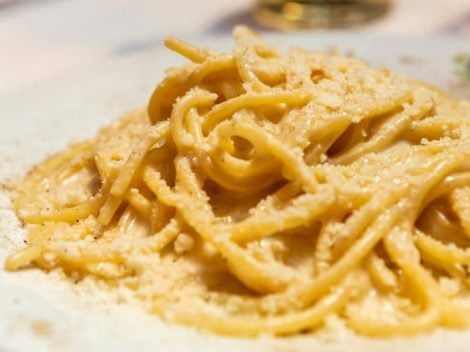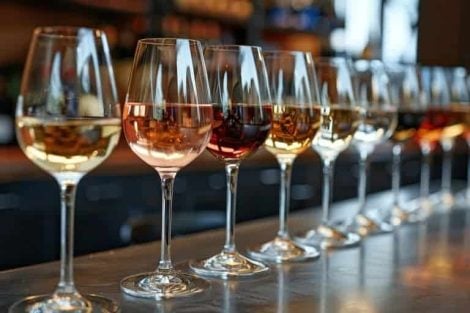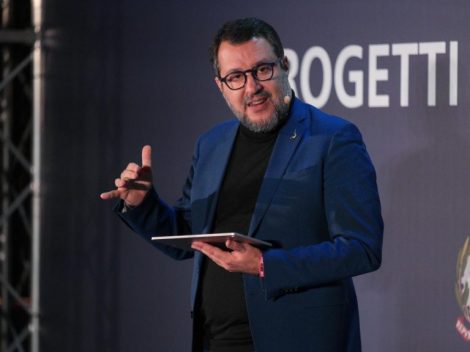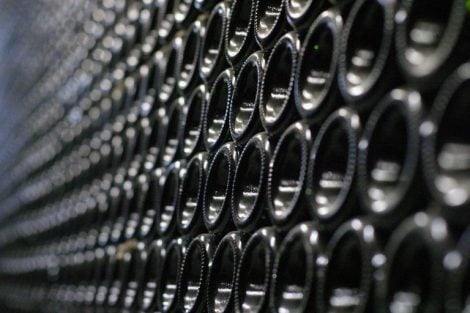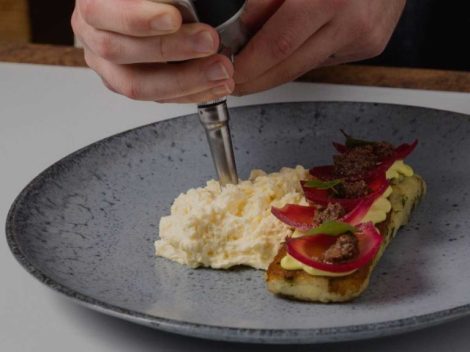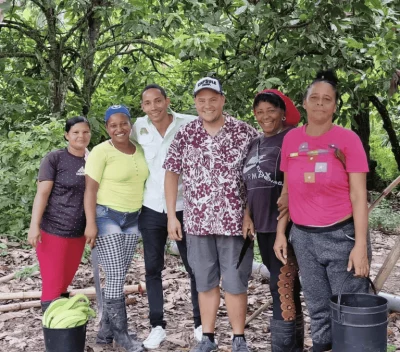The bicycle and the vegetable garden. Enrico Crippa is an unusual figure in the Italian chef star system: he has no social media profile, doesn’t do consulting. He lives to cook. At first glance, he’s shy, extremely reserved, and some say he’s particularly strict and demanding in the kitchen. We catch him between a Piedmontese salad and a guinea fowl cooked to perfection at Piazza Duomo in Alba: Tre Forchette (with 97 points, the highest score) and Three Michelin Stars.
Enrico Crippa has just returned from a holiday in France, so let’s start with his reflections on travelling among the best restaurants across the Alps…
What did you bring back in your suitcase?
A confirmation. I visited 4-5 Michelin-starred restaurants: all the customers seated around me were French. How lovely to see these tables with entire local families celebrating an occasion. There’s this custom of going to the nearest high-quality restaurant to carve out some time now and then to fully enjoy themselves. Listening in at the tables, I got a firsthand feel of this French pride they have. This sense of respect for fine dining is completely missing here.
On the contrary, the disconnect from fine dining seems to be growing strongly.
We have a very international clientele; we only see Italians during the low season. And I hardly ever have tables of more than four people. This sense of detachment has always been there: the fear that they won’t give you enough to eat, or that you’ll need headphones and superpowers to understand the dish in front of you. And we’re always so prone to complaining. We go out for the pleasure of finding something wrong. Not to have a good time.
Where does this very Italian trait come from?
Hard to explain. Even the French, speaking of chefs, seem to be all friends and very close-knit, although that’s not really the case. However, they share this idea of togetherness, they have this feeling of belonging to a great nation. And cuisine is an integral part of this vision they are proud of throughout the world. It’s like a branded logo that you carry within you and want to display.
Ah, these French...
I was with a friend, the chef Eric Pras from Maison Lameloise. We were talking about products and brands, and I asked him why they took the rooster as a national emblem. “Because it’s the only animal with its feet in the muck that keeps on crowing.” His answer says it all; there’s something historical behind it. In France, you can go to a village of 500 inhabitants, and you’ll find an ordinary butcher, and right after a boucherie displaying the best country terrine awarded in Paris. There’s this work-related culture, and even within trades, there are the best blacksmiths, marble workers, chocolatiers. If you do something, you must do it well. And if you communicate it, you’re even cooler.
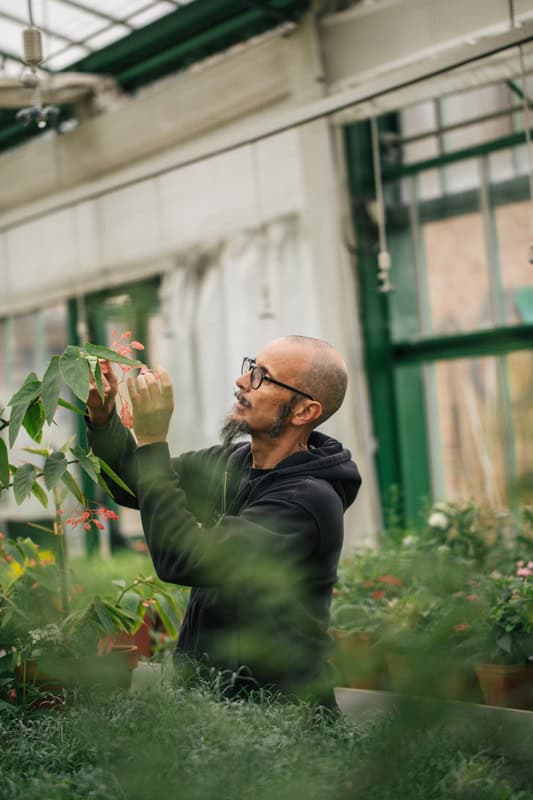
Enrico Crippa in the vegetable garden. Photo: Letizia Cigliutti
And us?
We have never really believed in ourselves as a group, but we have extraordinary individuals, qualities that can also be a strength. But in today’s world, being part of a nation that can always lift you up wouldn’t be a bad thing.
Differences in wine too?
Yes, the great French restaurants have very few foreign wines on the list. Our wine lists are crammed with international labels; there’s always plenty of France. And everyone drinks French wine, saying how wonderful it is. And that’s not always true. Of course, when they drink our wines, they’re astonished by their quality because they often don’t know them. What can I say, they’re better at it.
The original question, fine dining crisis: are you feeling it?
This year there has been a downturn in the sector, in Italy and globally, both in fine dining and luxury hotels. For me, the deciding factor is clear: how powerful is the emotion you give in your fine dining? How unique, personal, what is your attraction power? We have the good fortune of a land like the Langhe with an incredible culinary tradition, wines loved worldwide, and a unique and rare product like the truffle with incredible appeal. We’ve had slightly fewer customers, but the average receipt has increased. Certainly, the entire Asian market has slowed down a bit; many people live in uncertainty, fearing an unexpected economic crisis. Not to mention the influence of ongoing wars, I see a cautious, wait-and-see attitude.
Are you afraid?
Yes, because fine dining is my whole life. I love to cook; I’d enjoy myself even in a trattoria, but I would never be able to convey a thought, a philosophy, a gesture beyond good food. It doesn’t always have to be about technique, cooking, or cutting; I mean a message, even just in how a dish is presented. That ability to evoke a memory you had stored away. There’s so much behind a fine dining experience.
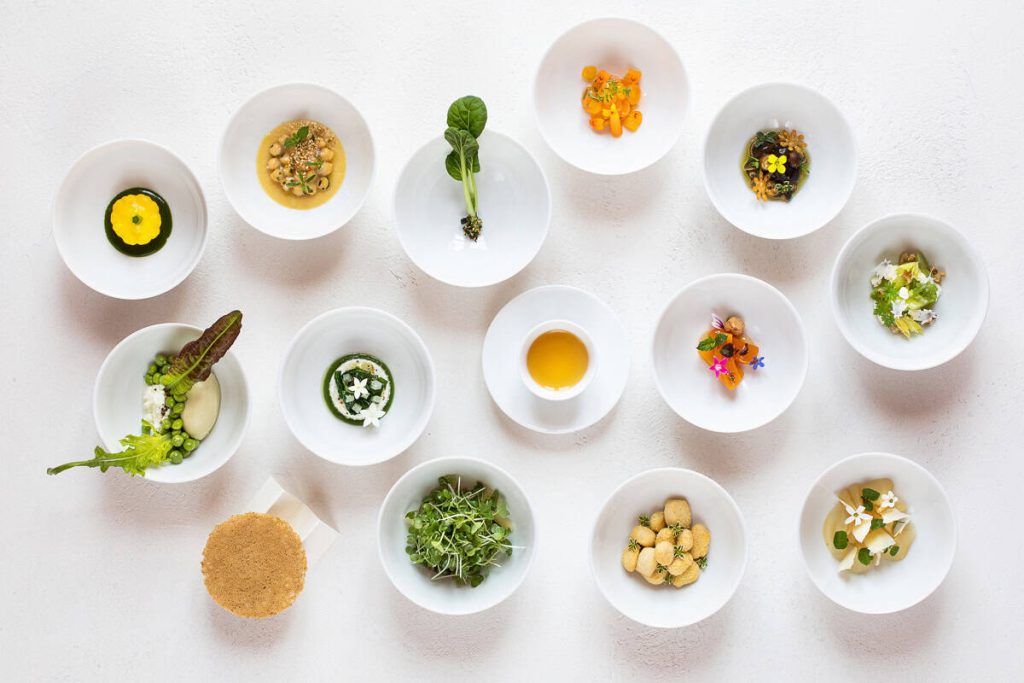
"Enrico Crippa's garden-inspired starter at Piazza Duomo in Alba (CN)"
Yes, but many experiences are repetitive, if not boring.
True, some focus solely on the raw ingredient, taking the best and throwing it on a plate. But that’s not enough anymore. Food is culture, intelligence. Historically, better food has been enjoyed where there was great culture, I think of the Mediterranean basin: the Greeks, the Romans, Spain, the Arab world. I repeat, a decline is there, but let’s put it into context: in Italy, fine dining has never really taken off. Restaurants at that level have always been mostly frequented by foreigners.
Italians, mamma’s boys and trattoria lovers?
We’ve always been used to and happy in a trattoria where we know what we’re being served. We judge by the standards of our family, mum, grandma, our region. And it’s not just a matter of price, as there are trattorias today that hit you hard. But a certain protocol, a certain way of being at the table, has broken down.
Do you like the term fine dining?
No.
Michelin-starred restaurant?
Not that either. We need to find a new name: signature cuisine? Culinary excellence? The important thing is to diversify the offer, to bring out a personality in the kitchen, the characteristic that should be felt when you visit our restaurants. The cuisine must be yours: you taste it here in Alba, and you won’t find it elsewhere. Because yes, it often is too similar whether you’re in the mountains or by the sea.
And we end up eating the same cod from the same supplier or vacuum-packed octopus.
Being original day to day, but also week to week, or month to month is challenging. You always have to be on the ball; it’s exhausting. We work with many local suppliers, even tiny ones. For example, the guinea fowl you just ate is from a farmer nearby; I only have enough for 30 customers, and I already know that tomorrow I’ll need an alternative. I find it beautiful. It brings us back to marché, market-driven cuisine, the philosophy that was instilled in you in the 80s.
Uniform menus reduce risk and effort?
I couldn’t have a menu that runs from January to December. I wouldn’t be able to do it; I wouldn’t know how to fill my days. I need new challenges. Today I’ll pull 150 leeks the size of a pencil from our garden, then I’ll have to wait another two weeks to have them again. I’ll have to be ready and alert: what do I put with them? And after that? Surely I’ll need to think about changing the accompanying sauce. And I’ll need to explain the work to 20 people.
Is something changing?
I see it in my brigade; they look at each other: “Damn, we have to change this too tomorrow.” Over the years, I see an increasingly weak fire in young brigades. Maybe we need to ignite it ourselves. I go hard every day and give them stimulation, but the fire in the eyes I saw 10 years ago, when we had Donato Ascani, Gabriele Boffa, Domenico Marotta, or Antonio Zaccardi here, I no longer see it. And if I don’t see the fire, I, who feed it, also lose strength. Especially if I don’t see that what I teach is internalized and retransmitted. Even during service: I used to run, burn myself, go mad if I saw something new. Today, they’re annoyed by new things.
And so, identical suppliers and no-risk cooking. I insist on suppliers.
If you always use that product, it will always be easy to manage, whether it’s hot or cold. It will always be the same recipe. I, if I know a guinea fowl has eaten differently, change the cooking, balance the humidity. Then I understand that a chef may have a thousand commitments, consulting, recipes sent via email. All this makes you safer; you’ll always know that that meat cooked that way will be perfect. No hassle or problems.
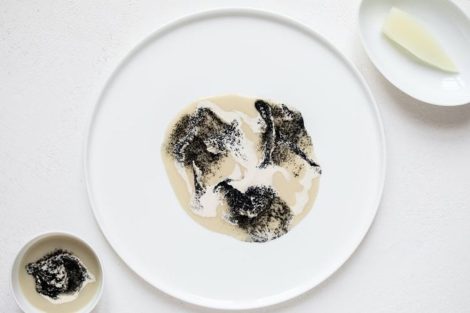
The cuttlefish. A tribute to painter Anselm Kiefer
Let’s return to Italy-France. It’s clear how important the gastronomic engine is for tourism.
I have many friends in France who have even been supported by municipalities. In a town, they knew there was a talented young person and gave him a free space to start his restaurant. And to enhance the area. For several years he didn’t pay rent; we’re talking about 2 Michelin stars today. Gastronomic tourism is also growing here, but I don’t think it’s a well-developed concept. Yet, we have incredible things in Italy; you eat well everywhere. But that’s the issue: too many things are done well everywhere; there’s a lack of focus, of fine-tuning.

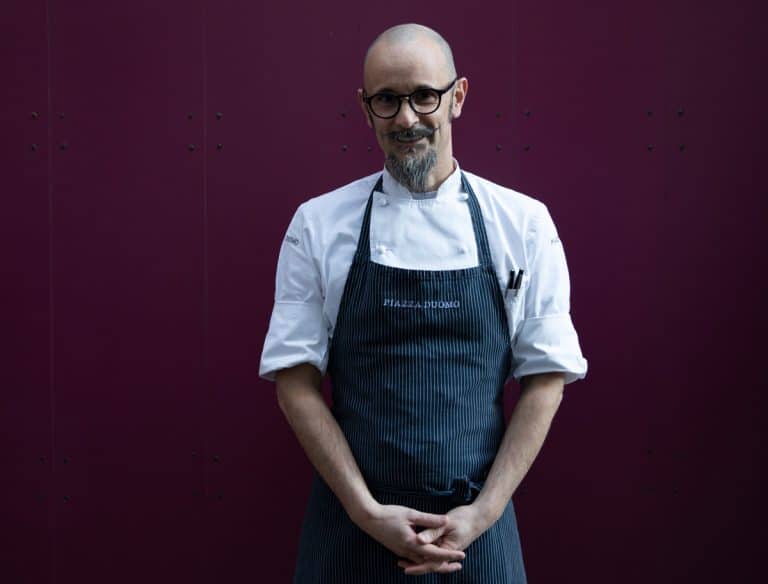
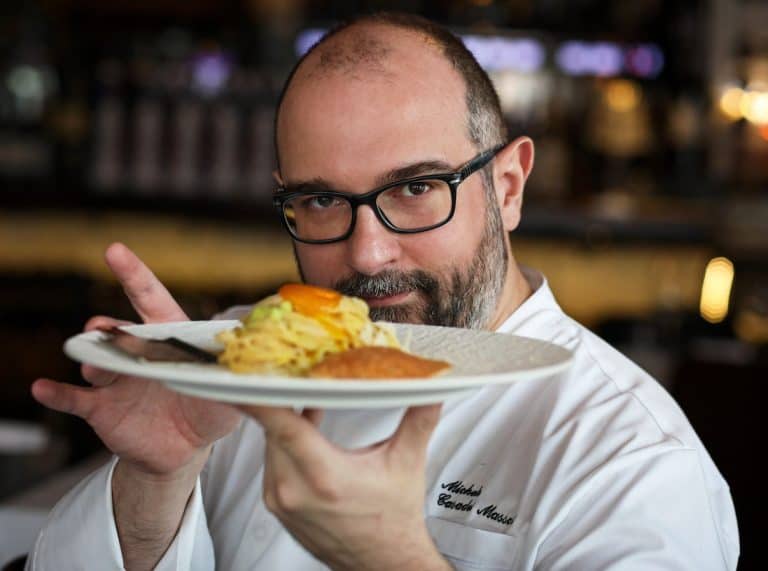 "I wake up every morning with the idea that I don't know how to cook." The chef who enchanted New York with a restaurant without a menu
"I wake up every morning with the idea that I don't know how to cook." The chef who enchanted New York with a restaurant without a menu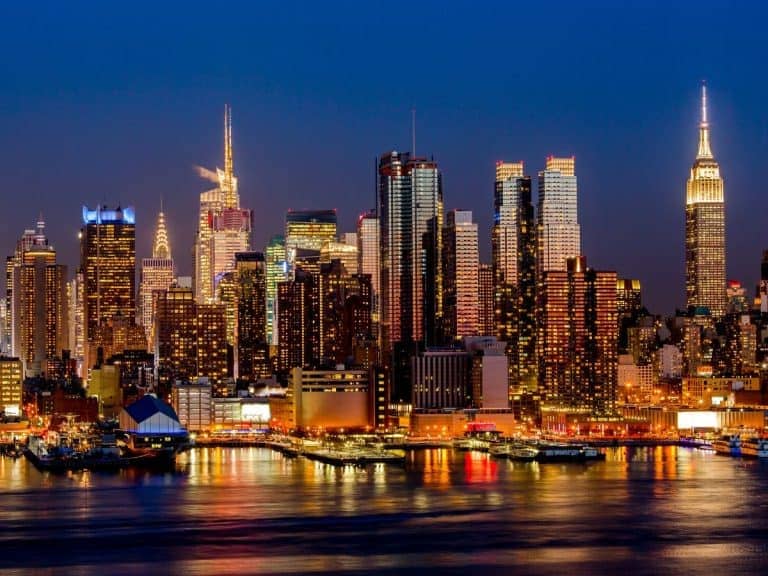 From the Metropolitan Pavilion to the Top Italian Restaurant: Gambero Rosso showcases Italian wine in New York
From the Metropolitan Pavilion to the Top Italian Restaurant: Gambero Rosso showcases Italian wine in New York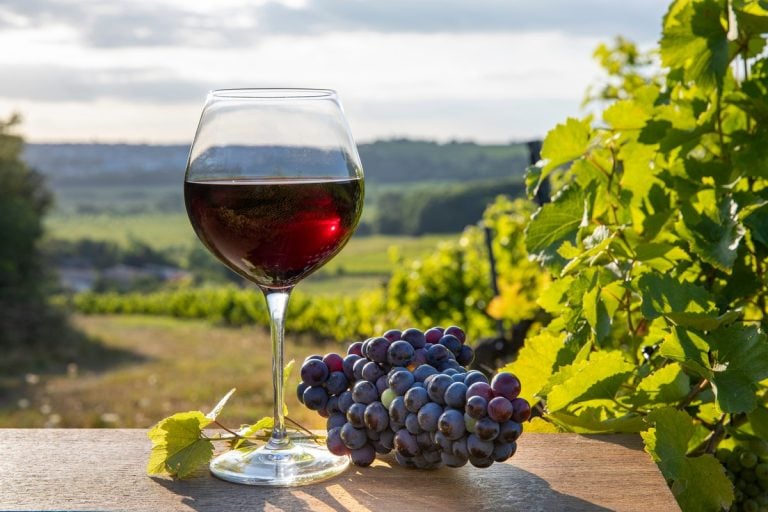 The 14 best-value Pinot Noir wines among reds, rosés, and sparkling wines chosen by Gambero Rosso
The 14 best-value Pinot Noir wines among reds, rosés, and sparkling wines chosen by Gambero Rosso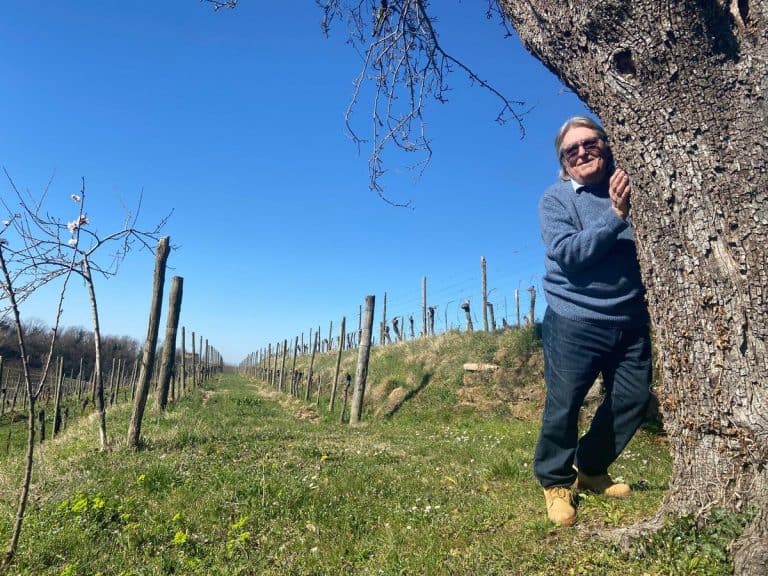 One of the best Pinot Bianco wines from Friuli Venezia Giulia is made by a former Bbnker. Here’s which one
One of the best Pinot Bianco wines from Friuli Venezia Giulia is made by a former Bbnker. Here’s which one Spoiler: wine export to the US in 2024 will break records, but consumption will decline as well
Spoiler: wine export to the US in 2024 will break records, but consumption will decline as well
